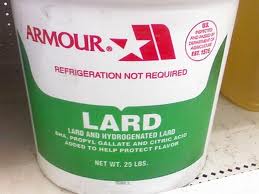After receiving several comments and emails, I decided to write a bit more about oils. The following comment by Lynda Eggimann describes the situation well. When things are good we try to get fat OUT of our diets, when things are bad, we have to get fats INTO our diets. It’s just a different way to think about those oils.
A cookbook from 1918 had a section on fats and oils which included the following statement. “In the purchase of meat, the careful housewife should see that the butcher gives her all the fat she pays for, as all fats can be rendered very easily at home and can be used for cooking purposes”. This shows a completely different attitude than today. In both World War 1 & 2, many people in Europe suffered medical problems form a lack of fats and oils.
One thing that I did not mention yesterday that I do myself is store olive oil in the freezer and rotate the bottles. In case of an emergency and they have to be thawed out, this starts the shelf life. I also store dehydrated peanut butter, spam and other oil and fat containing products.
Regarding the storage life of oils, I found the following statement made by Oscar A. Pike BYU Food Science Professor. “Fats and oils vary in their ability to store for prolonged periods. Generally, shortening can be stored for several years, whereas cooking oil must be rotated more frequently. The storage life of fats and oils and foods containing them varies widely for several reasons: (1) storage conditions differ, (2) expiration dates differ, (3) most food products contain a mixture of different kinds of fats that vary in stability, and (4) individual consumers differ in their ability to tolerate rancidity. What may taste acceptable to one person may taste unacceptable to another. However, almost everyone can detect rancidity when only a very small amount of fat or oil has deteriorated. Thus foods containing even less than 1 percent of fat or oil can have a reduced storage life because of rancidity.”
The cause of rancidity is oxidization, an inevitable process due to the exposure of a fat or oil to air, heat, and light. The more polyunsaturated a fat is, the faster it will go rancid. Examples of oils with a high polyunsaturated fat content are flaxseed oil, sunflower oil, corn oil, and soybean oil. Butter, palm oil, and olive oil have relatively small amounts.
This brings us to Coconut oil which is very low in polyunsaturated fat and therefore has a better storage life than most oils. Coast Coconut Farms makes the following statement on their website located at https://www.coastcoconutfarms.com/ContactUs/. “Due to its exceptional stability, our coconut oil has a long shelf life 5 years when properly stored in cool, dark place, coconut oil is ideal for food storage, and does not have to be refrigerated”.
A couple of tips on storing oils and fats.
If you mix new and old oils even in small quantities, this will hasten rancidity.
Label on lard should be checked for the proper storage method, some types of lard, depending on the processing technique, can be stored at room temperature, while other types need refrigeration.
In a few days I will post some old techniques on how to render meat fat and extend table fats.
Howard



Have enjoyed this about oils. It is a very good help.
i have enjoyed your information regarding fats and oils also…but i have never heard of freezing olive oil… now when i open a new bucket or pkg of lard i do refrigerate it although the label says refrigeration is not needed-i do this cause i have had shortening and lard go rancid after opening-it takes a long while for this to happen but it can happen. could you please give more information regarding the freezing of olive oil?
Olive oils freeze wells in plastic bottles. I have tried it and it thaws out fine. Freezing doesn’t seem to bother the oil other than slow down the oil turning rancid.
Howard
I use extra virgin olive oil almost exclusively for health reasons. I started freezing it a little over 4 years ago. I recently rotated out a bottle that I had dated 3/18/2007. It thawed clear and smooth and taste is like I bought it yesterday. Long frozen oil seems to have the same opened shelf life as a store bought and immediately opened bottle.
I am thinking that as long as I have freezing capability I can store olive oil.
greg
God BLESS YOU FOR THIS! I literally just prayed for this answer
To keep it short:
1. Don’t use “vegitable”: oils (corn, canola etc). These are actually industrial seed oils and are rancid when you buy them.
2. Use olive oil for making your own salad dressing.
3. Use Ghee and coconut oil for cooking. Ghee, properly made,will last years. Coconut oil will store for a couple of years at least.
4. Don’t buy any oils or lard etc that have been hydrogenated.
5. Don’t worry about saturated fats. The lipid hypotheses has been proven wrong. Why esle would human breast milk be 43% saturated fat?